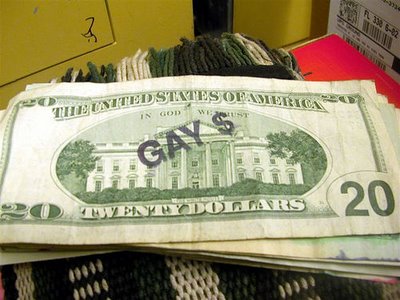 CHICAGO, ILLINOIS - Even before any weights are lifted, laps swum or races run, the Gay Games VII is looking like a big winner.
CHICAGO, ILLINOIS - Even before any weights are lifted, laps swum or races run, the Gay Games VII is looking like a big winner.With more than $10 million worth of sponsorships already in hand -- and the possibility of a few million more to come -- this year's version of the alternative quadrennial sports competition is already the all-time money champion for any gay event in history.
The Games, featuring a lineup of many of the same sports seen at the Olympics, runs July 15-22, kicking off at Chicago's Soldier Field and holding closing ceremonies at Wrigley Field. The Games has attracted a blue-chip roster of companies eager to hawk their brands -- and no event to date is more indicative of how mainstream firms have abandoned inhibitions about marketing to gays.
Among the hundreds of sponsors pouring cash and in-kind support into the Games are American Airlines, Walgreen, PepsiCo, Kraft, New York Times, Cendant's, Orbitz, Viacom's Logo television channel, Sirius Satelite, Disney's ESPN and Ernst & Young.
Individual sponsorships range from as little as $500 to more than $1 million, said Kevin Boyer, a board co-director of the Games. "We are already over $10 million, and, when all is said and done, we could be close to $13 million."
That is a record amount for a gay event as is the overall number of sponsors -- 317 and counting -- that have already committed "and they just continue to come in," Boyer said.
"Ten years ago [marketing to gays] was seen as a risk," he added. "Now it is seen as an opportunity. And this is a very unique event, a large event in a community and city that has been very supportive."
Indeed, Boyer expects more than 100,000 people to participate in some way -- as athletes, spectators or volunteers. Considering the 400,000 who turned out June 25 for the 37th annual Pride Parade here, that estimate could be conservative. And the Windy City has rolled out the red carpet, with Mayor Richard M. Daley among the biggest boosters.
The athletic contests and the accompanying revelry should also attract considerable press coverage, with the local NBC affiliate also a sponsor, a team from Logo in town and continuous coverage on Sirius.
Boycotts and letter-writing campaigns
Not everyone is so enthusiastic.
A handful of groups, including the American Family Association, has attacked the Games and attempted to pressure sponsors into bowing out with letter-writing campaigns and threats of boycotts. Their efforts have thus far have failed.
"The AFA has continued to try and intimidate companies, but generally speaking [the companies] have gotten to a place where they simply acknowledge the feedback and explain the reason for their participation," said Mike Wilke, executive director of the Commercial Closet Association, a group which works to educate advertisers on gay perspectives.
Wilke chalks up the determination of companies to stand firm to "momentum that has built over the years" and the fact that "they are increasingly comfortable in targeting the gay market," a well-heeled and loyal group, he said. In addition, "the strength of employee groups in getting companies to support the market is substantial," he said.
Peter LaBarbera, executive director of the Illinois Family Institute, said he is not surprised at the level of sponsorships "because of the whole drift of the corporate culture in this area."
He added that the "they get a lot of free publicity and free goodwill [in the media] because of political correctness."
Groups like his have also been outmaneuvered, he conceded. "We focused on the political game, and the gay activists focused on the corporations. They beat us to the punch."
Walgreen Co. was among the top targets of the anti-Gay Games campaign, with open letters to the company's and exhortations to contact it posted on multiple Web sites. "We have gotten a lot of feedback," conceded spokesman Michael Polzin, including a mass e-mail effort protesting the company's participation.
It has had zero effect, he said: "We committed to a certain level of support, and that is what we are seeing through."

Other companies seem to have entirely escaped the wrath of the anti-Gay Games groups. "Nobody has said anything about our sponsorship," said a spokeswoman for American Airlines.
William Chipps, editor of the IEG Sponsorship Report, an industry newsletter, said that anti-gay and other pressure groups "do seem to have lost their power to a certain extent. Most corporations are now smart enough not to be scared by actions from small groups."
Strength in numbers
Companies are also realizing just how good a demographic they can reach by going after the gay market, which represents more than $600 billion in annual purchasing power, according to some estimates.
Gay media has been riding the wave for some time. In 2005 marketers spent just over $212 million in gay and lesbian publications, according to a survey by Rivendell Media. That was up just 2.5% from the prior year but almost 200% from 12 years ago. And ads are getting more focused.
Rather than simply repurposing mainstream ads, about half of those in the publications had "gay-specific" content -- a fourfold increase in just three years. Nearly 200 brands from Fortune 500 companies are advertising directly to the market.
And those kinds of numbers have helped insulate companies from any negative fallout.
"We have reached critical mass," said Howard Buford, founder and CEO of Prime Access Media, a multicultural ad agency in New York. "At this point, any kind of organized negative action is virtually untenable. In order to implement a [boycott], you have to have an alternative. Companies have found there is real strength in numbers on this."
Buford pointed out that events like the Gay Games can also reach far beyond a narrow demographic.
"Many companies go after the youth markets, and this is one of the concepts they use," he said. And since many hot trends, from fashion to music to food, start in the gay community, "they can speak to the broad spectrum of younger consumers."
The Gay Games will cost about $9.5 million in cash and $10 million in in-kind donations to produce, Boyer said, and is targeted to generate net proceeds of $100,000 to $200,000.
In addition to sponsorships, the organizers are collecting revenue from registration fees, ticket sales, donations and special events. Boyer expects 30,000 people to be on hand for the opening ceremony, he said, and thousands more to attend individual events. There are more than 30 sports and a couple dozen venues. Admission fees range from free to $15
from Market Watch
No comments:
Post a Comment